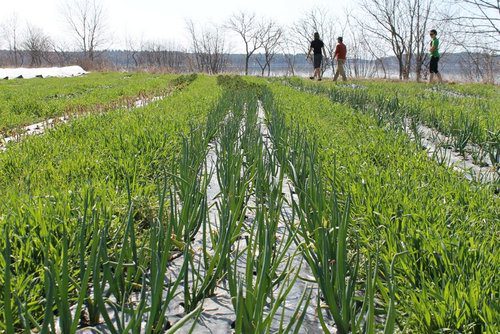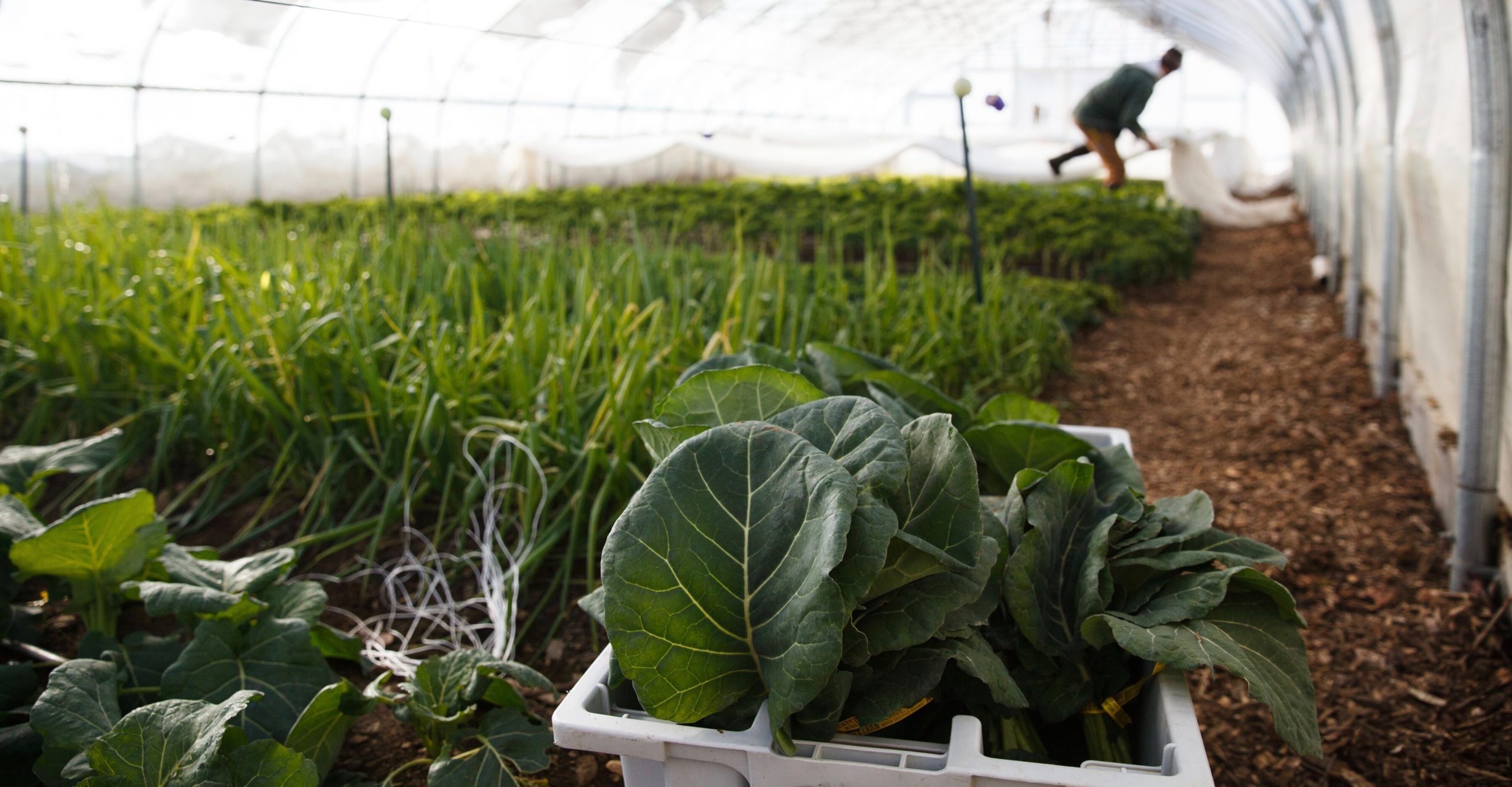Among the boundless concerns provoked by COVID-19, food supplies are top of mind for many Maine residents. The fear for consumers can be visceral: With store shelves emptying quickly, will there be enough to go around? As more states experience lockdown, can supply chains hold?
Maine farmers are anxious about food as well due to new challenges balancing supply and demand. Wholesale growers, having lost accounts with restaurants and institutions, face the prospect of having perishable goods spoil. Market gardeners, in order to maintain retail sales, must quickly adapt to social distancing protocols.
Even in normal years, early spring can be a lean time on farms, with minimal income and high expenditures – gearing up for the growing season. This year, “it’s a really complicated picture,” says Bo Dennis, new farmers program specialist with the Maine Organic Farmers and Gardeners Association (MOFGA), who notes that the site with agricultural guidance regarding COVID-19 gets “updates several times daily.”
Farmers are struggling to incorporate new safety procedures and staffing requirements while simultaneously reinventing their marketing strategies. Dennis has “seen really creative brainstorming sessions” in which farmers discuss how best to support their communities, particularly the members who already struggle with food insecurity.
Richard Brzozowski, food system program administrator for University of Maine Cooperative Extension (UMCE), acknowledges that “there are still a lot of unknowns,” but says he’s “so proud of our farmers” for their willingness to be “nimble enough to respond.”
Keeping a Safe Distance
Even before CDC guidance came out for farmers’ markets on March 19, James Gagne and Noami Brautigam of Dickey Hill Farm in Monroe were brainstorming how they could transform the shopping experience at the winter Belfast Farmer’s Market “for our own safety and so our customers could stay healthy and safe,” Gagne recalls.
In the course of a weekend, they developed an online ordering system, posting notice of it on social media. “People reacted really positively,” Gagne says, and roughly three-fourths of their inventory that week sold via online orders. This week, he anticipates, all of the inventory might sell that way.
“It’s hard for us and for some of our customers” to lose the market interactions, Gagne reflects, but he and Brautigam remain determined to keep their products widely accessible. The farm is offering home delivery, and is working to get a SNAP (Supplemental Nutrition Assistance Program) card reader so those eligible for benefits can more readily buy food online. It’s important that people know “small farms are here for you in hard times,” Gagne adds.
Pivoting from Wholesale to Retail
On March 16, Allison Lakin, a farmer and cheesemaker in Waldoboro, shared with UMCE and others a spreadsheet she created to help consumers find farm products and to help farmers share their needs. Jason Lilley, a sustainable agriculture professional with UMCE, shared the link with a listserv that includes about 250 vegetable and dairy farms in Maine.
“Overnight, it [the spreadsheet] went to 60 entries,” Lilley says, and he realized “there was something behind this.” In two days, UMCE staff members from around the state, all working remotely, assembled an online “Farm Product and Pickup Directory” based on the spreadsheet.
Within a week of its launch, the directory has grown to include more than 235 farms and has gotten 30,000 views. MOFGA has also posted a map of organic farms offering on-site sales, curbside pickup for pre-orders or home delivery.
As more consumers seek out farm stands, some food producers are gearing up to sell prepared foods there. Lakin is already offering homemade pastas and meat stews – incorporating her handmade cheeses and meats from East Forty Farm and Dairy, which she runs with Neal Foley.
Needing More than Customers
Even before Covid-19, Maine consumers needed little persuasion to buy local foods. The state ranks fifth in the nation on the Locavore’s Index, which compares states based on the value of farm food sold directly to consumers and the value of locally sold agricultural products. The state’s attraction for “foodies” may be new, but for many residents eating local is more tradition than trend.

Now consumers are poised to purchase even greater volumes of local food, but farms need support to meet that demand. To learn how best to help farmers with the Covid-19 challenge, UMCE, Maine Farmland Trust, MOFGA and other agricultural partners are currently surveying farmers.
Responses to date, Dennis says, indicate concerns about extending credit and navigating loan repayments during the economic downturn. Many farmers also want to see congressional bills recognize diversified vegetable operations and flower producers (not just commodity growers), and they want SNAP benefits extended.
A Wake-up Call
“There’s a great deal of adjustment that has to be made” within Maine’s food system, notes Joe Blunda, CEO of the firm Forager, which provides technology and services to connect wholesale buyers with local food producers. Some farmers are not set up to sell directly to consumers or to supply grocers. “The last thing we want is for [those farms] to cut back,” Blunda says. “What we do now affects how well we can weather this later in the process.”
Harriet Van Vleck, coordinator of Merrymeeting Food Council, echoes that sentiment, noting that “communities that can feed themselves are more resilient.” Maine is already seventh highest among states for food insecurity and third highest for extreme food insecurity.
For farms that can weather the current turbulence, “the dynamics of demand will fundamentally shift,” Blunda predicts, as “consumers are going to want the safety and quality of local food” beyond this immediate crisis.
COVID-19 could be an opportunity “for consumers to rethink food resiliency,” Dennis says, and build relationships with producers not tied into a global industrial food system. Brzozowski sees the current crisis as “a wake-up call: We need to be ready with more foods grown within the state.”
And, he adds, “we need to be optimistic. Farmers are eternally optimistic.”
Resources:
- Maine Farm Product and Pickup Directory
- Cumberland County Food Security Council’s COVID-19 resource page
- Maine’s Local Twenty (Foods produced and available year-round)







